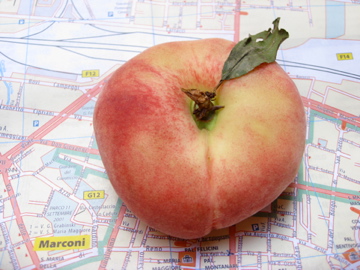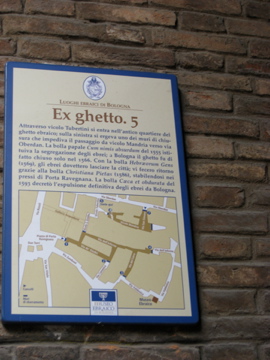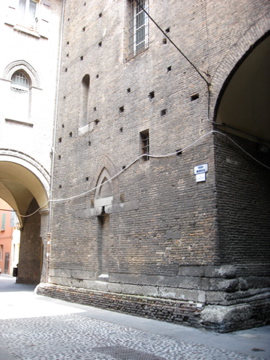2: è differente essere Ebrea

That is a peach. It is gorgeous. You can’t smell it, but I could and it’s the kind of food that makes you think “if I eat this, it will become part of me, that’s just fantastic.” Bologna is famous for its food. Obviously they invented Bolognese sauce (served here over golden yellow buttery melt-in-the-mouth tagliatelle, not spaghetti), but also apparently lasagne. And just down the road is Parma. As in Parma ham and Parmesan cheese. Basically everything here is amazing; the tomatoes are specially incredible this time of year, just so sweet.
So, I’ve had a lovely day wandering around – not just sampling the food – until the heat overcame me. Walking back to my hotel I spotted this:

OK, were you a geeky child? It will not surprise you to learn that I was. Did your parents take you on holidays to historic English towns and to museums and exhibits called things like “The Museum of the Wool Industry” or “The bubonic plague hits Cirencester” or “Medieval Hereford”? Mine, naturally, did. And did you find yourself thinking something like “wow, if I’d been here in Medieval times, I wonder what I would have been doing, would I have had to card wool like in that educational diorama?” Maybe you did: we’re sort of encouraged to do that in GCSE History. Imagine that you are a street urchin; write 200 words about your daily life.
The thing is, my dad’s an historian and knows a thing or two about what actually went on. So when I said to him “dad, if we’d lived in Victorian Bath/Medieval Worcester/Elizabethan Aberdeen, what would we have been doing? Would you still have been a professor? Would we I have had to get a job cleaning chimneys?”, he’d generally reply “well, we’d have been Jewish, so it would have been different.”
And it is. Everywhere, and everywhen, pretty much, except here and now it’s been different. A parallel history. Here in Medieval and Renaissance Bologna there are people inventing lasagne and building towers and founding the world’s first university and all sorts. And there are the Jews, in the ghetto.
I had a little explore of the ghetto – I might go back properly tomorrow. My guidebook had said it was “quiet” and they’re not kidding. It’s like the minute you step off the main streets and into the ghetto the sound is deadened. Presumably the walls are thicker – perhaps Jewish people wanted to protect themselves from attack, or the Bolognese built thicker to cut themselves off more firmly – but also there aren’t so many shops. The buildings are closer together. The few people seem to speak more softly. The walls are high and the streets are narrow.

What is one to do with a history like this? To forget it seems an insult to those who lived it. To insist upon it seems churlish to a world which now says “no no, we’re all the same, please accept our apologies and come and join in the fun. We have Parmesan cheese!” It is a big and unanswerable question. What to do with history?




 Previous post
Previous post
